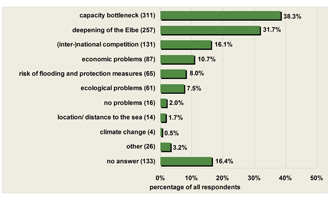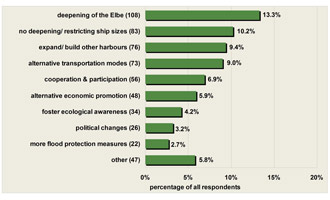

Disclaimer:
The authors are solely responsible for the content of this report. Material included herein does not represent the opinion of the European Community, and the European Community is not responsible for any use that might be made of it.
Back to overview reports
Apart from the linguistic challenge of finding a common language, it is also important to understand local problem awareness. Acceptance and active support of decisions made by authorities is probably easier to come by if residents understand how compromises were reached and what alternatives were abandoned for which reasons. The example of the deepening of the Elbe has shown that people within the region are quite well informed. But does this also apply to topics that attract less media coverage, such as land use conflicts within the region? In terms of land use conflicts, nature conservation is considered to offer the most serious potential for conflict since people perceive nature conservation to be incompatible with other land uses. In the rural parts of the Elbe region, nature conservation and agriculture are perceived to be the main conflict, in the other parts, it is nature conservation and industry. However, these answers mostly reflect general opinions about the interaction of different land uses and do not refer to existing regional conflicts. The results of the Hamburg telephone survey underline these findings.
Respondents showed greater interest and knowledge when asked about future problems of the port of Hamburg. Limited capacity is regarded as one problem that might challenge the port (38.3%) (see Fig. 5), aggravated by the constantly growing ship sizes. Other problems mentioned are the deepening of the Elbe (31.7%) and (inter-)national competition (16.1%) especially between Hamburg and the new deep water port in Wilhelmshaven. Respondents offer a variety of solutions to solve these problems: deepening of the Elbe (13.3%) (see Fig. 6), not deepening the river but restricting ship sizes (10.2%), building and using other ports on the coast (9.4%) and inter-port cooperation (6.9%). A number of respondents wanted politicians and authorities to focus more on forward-thinking planning and to organise decision-making processes in a more transparent and participatory manner.
In the telephone survey, the most common answers received from the tidal Elbe concerning the port of Hamburg were read out to be evaluated. With respect to future problems of the port, people in Hamburg are most concerned about competition between ports and ecological problems, with their most favoured solutions those that strengthen the competitiveness of the port of Hamburg. Cooperation with other ports and the deepening of the Elbe are considered to be the most important measures to prevent future problems. Alternative solutions for developing the region without strengthening the port are only supported by one quarter of the respondents.
Back to top
How can public acceptance for management actions be increased?
How can public awareness regarding estuaries be evaluated (Elbe case)?
The tidal Elbe - a people's perspective
Table of content
4. 4. Communication and Knowledge
Good information flow and a common language are essential in building up trust and establishing a high level of cooperation. Results of the Elbe quiz demonstrate that the technical terms used by authority staff and scientists in their everyday work are unknown to ordinary people. The only term that was widely known was tide (96.7%). Most people did not know whether the tidal range is highest in Hamburg, Cuxhaven or the German high sea island of Heligoland, with only 35% of all respondents giving Hamburg as the correct answer. The telephone survey in Hamburg led to the same result. The technical terms Elbe sediments and river maintenance were unfamiliar to most residents, but the right answers could quite easily be picked out of three given choices. Choosing the correct definition for the German term for estuary (Ästuar) was the most difficult task within the quiz. Only 23.5% of all respondents chose the right answer. 66% thought Ästuar was a device to measure flow velocity. These examples show that simple language or an explanation of technical terms is needed in conversation with the public to avoid misunderstandings and discouragement.Apart from the linguistic challenge of finding a common language, it is also important to understand local problem awareness. Acceptance and active support of decisions made by authorities is probably easier to come by if residents understand how compromises were reached and what alternatives were abandoned for which reasons. The example of the deepening of the Elbe has shown that people within the region are quite well informed. But does this also apply to topics that attract less media coverage, such as land use conflicts within the region? In terms of land use conflicts, nature conservation is considered to offer the most serious potential for conflict since people perceive nature conservation to be incompatible with other land uses. In the rural parts of the Elbe region, nature conservation and agriculture are perceived to be the main conflict, in the other parts, it is nature conservation and industry. However, these answers mostly reflect general opinions about the interaction of different land uses and do not refer to existing regional conflicts. The results of the Hamburg telephone survey underline these findings.
Respondents showed greater interest and knowledge when asked about future problems of the port of Hamburg. Limited capacity is regarded as one problem that might challenge the port (38.3%) (see Fig. 5), aggravated by the constantly growing ship sizes. Other problems mentioned are the deepening of the Elbe (31.7%) and (inter-)national competition (16.1%) especially between Hamburg and the new deep water port in Wilhelmshaven. Respondents offer a variety of solutions to solve these problems: deepening of the Elbe (13.3%) (see Fig. 6), not deepening the river but restricting ship sizes (10.2%), building and using other ports on the coast (9.4%) and inter-port cooperation (6.9%). A number of respondents wanted politicians and authorities to focus more on forward-thinking planning and to organise decision-making processes in a more transparent and participatory manner.
In the telephone survey, the most common answers received from the tidal Elbe concerning the port of Hamburg were read out to be evaluated. With respect to future problems of the port, people in Hamburg are most concerned about competition between ports and ecological problems, with their most favoured solutions those that strengthen the competitiveness of the port of Hamburg. Cooperation with other ports and the deepening of the Elbe are considered to be the most important measures to prevent future problems. Alternative solutions for developing the region without strengthening the port are only supported by one quarter of the respondents.
Important to know
Reports / Measures / Tools
| Report: | Management measures analysis and comparison |
|---|
Management issues
How can communication between public-administration-science be increased?How can public acceptance for management actions be increased?
How can public awareness regarding estuaries be evaluated (Elbe case)?

